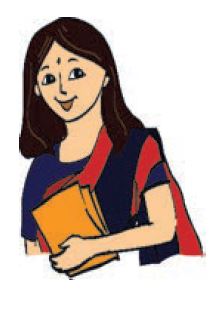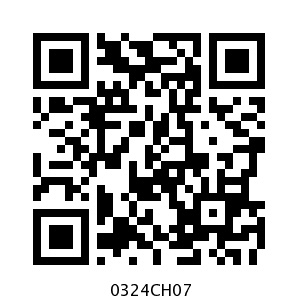Table of Contents
UNIT VII
Enjoy the rhythm of this poem.
Puppy and I

I met a Man as I went walking;
We got talking,
Man and I.
‘Where are you going to, Man?’ I said
(I said to the Man as he went by).
‘Down to the village to get some bread.

Will you come with me?’ ‘No, not I.’
I met a Horse as I went walking;
We got talking,
Horse and I.
‘Where are you going to, Horse, today?’
(I said to the Horse as he went by).
‘Down to the village to get some hay.
Will you come with me?’ ‘No, not I.’

I met a Puppy as I went walking;
We got talking,
Puppy and I.
‘Where are you going this fine day?’
(I said to the Puppy as he went by).
‘Up in the hills to roll and play.’
‘I’ll come with you, Puppy,’ said I.
A.A. Milne
New words
Village, hills, bread, hay, roll, play
Reading is fun
1. Who is the ‘I’ in the poem?
2. Where was the Man going?
3. Why didn’t the child go with the Horse?
4. Why did the child go with the Puppy?
Talk time
1. Do you have a pet?
2. Talk about three things that you and your pet do together.
3. How do you look after your pet? Tell the class first in your own language, and then in English.
Say aloud
| bread | hay | roll |
| said | today | pole |
Who am I?
Tibloo

Tibloo is my friend
Tibloo has four legs.
Tibloo has a long tail.
Who is Tibloo?
Tibloo barks.
Tibloo wags his tail.
Tibloo is happy.
Who is Tibloo?
Tibloo is my dog!
Let’s draw
Look at the dogs in the picture and write about them. You might begin: I am a little brown dog. My name is _____




Bull Dog Boxer German Shepherd Doberman
Join the dots and colour and name your dog.
Let’s write
1. Match the animals with their sounds.
| A | B |
| a horse | trumpets |
| a dog | bleats |
| a sheep | neighs |
| a cat | roars |
| an elephant | moos |
| a tiger | barks |
| a cow | mews |
2. List these animals under Domestic Animals and Wild Animals.
jackal, fox, tiger, dog, cow, elephant, bear, sheep, goat, buffalo
| Domestic Animals | Wild Animals |
|
|
|
|
|
|
|
|
|
|
|
|
|
|
|
3. Fill in the blanks with rhyming words.
Hill _____ _____
Hay _____ _____
Fine _____ _____
Get _____ _____
Going _____ _____
Hare_____ _____
Bruno

Bruno is my pet puppy.
He breaks his dish.
He is sad.
Daddy gives him milk.
But Bruno is sad.
Mummy gives him a new dish.
Now Bruno is happy.
Choose the right words.
1. Bruno is my _____. (pet/dish)
2. He breaks his _____. (dish/fish)
3. Daddy gives him _____.(water/milk)
4. Mummy gives him a new _____.(fish/dish)
5. Bruno is now_____.(sad/happy)
Little tiger, big tiger
There was a mother tiger and her small tiger cub. They lived near a river in a shady jungle. When the sky was dark, the mother tiger hunted for deer and pig. The tiger cub stayed close by his mother's side.

When the Langur monkey saw her, he called a loud, harsh call: "Watch out! A tiger is coming!" The sambhar deer bellowed, the kakar deer barked, and sometimes the game got away. She hunted then for jungle fowl, for pheasant and for frog, or went to the river for fish. But she did not hunt every night.
If the moon was bright, the mother tiger lay down and waited for the dawn. She twitched the tip of her tail, and the tiger cub pounced on her tail again and again.


If he went too far away, the mother tiger called him with a low, quiet grunt. The tiger cub came back, but he did not like to stay near his mother in the jungle at night.
One night the mother tiger was tired and closed her eyes. The tiger cub saw a tiny frog, hopping along the ground. The tiger cub pounced, but the frog hopped away. He chased the frog and caught it, and turned to show his mother. But she was not in sight. Instead he saw a tiger, bigger than his mother, near him in the jungle.
The tiger's green eyes glistened as he watched the tiger cub. The tiger cub was frightened. He could not hide or run. He let the frog hop away. The tiger crept up closer to the little tiger cub.

But a roar filled the jungle, the roar of the mother tiger! She faced the other tiger and he went away. The mother tiger liked to roar, a loud, big tiger roar, to tell all the other animals in the jungle that she was there. All the other animals in the jungle kept far, far away.
The tiger cub also liked to roar, a loud tiger-cub roar, to tell all the other animals in the jungle that he was there.
But all the other animals in the jungle were not afraid at all and none of them ran away.
But, there came a year when the small tiger cub was a full- grown tiger. He walked for miles alone, hunting for game at night. When he roared to tell all the other animals in the jungle that he was there, all the other animals in the jungle kept far, far away. And the great big tiger that had been a small tiger cub, hearing his own loud roar, smiled to himself a great big tiger smile.
Lois Hamilton Fuller
New words
Shady, bellowed, twitched, pounced, grunt, game, glistened, roared, pheasant, fowl
Reading is fun
1. Tick the right answer
i. Where did the mother tiger and her small tiger cub live?
a. near a river
b. near a mountain
c. near a forest
d. near a sea
ii. What did the mother tiger hunt when the sky was dark?
a. sheep and goats
b. fish and frogs
c. deer and pigs
d. donkeys and horses
iii. What did the tiger cub catch one night?
a. a deer
b. a frog
c. a pig
d. a cat
2. What happened to the little tiger cub when he chased the frog?
Word building
i. Match the animals with their young ones.
| horse | kitten |
|
| dog | calf |
|
| cat | colt |
|
| cow | puppy |
|
| pig | cub |
|
| tiger | piglet |
|
| sheep | kid |
|
| goat | duckling |
|
| duck | lamb |
|
ii. Word Game: Can you place these letters in their right order to form the names of animals?
e.g. a t c — cat
s e m o u - _____
r e s o h - _____
o i n l - _____
p e s h e - _____
r e d e - _____
l u b l - _____
g i t e r - _____
f o l w - _____
iii. The animals/birds in Column A have to reach their homes in Column B. Find out where they live.
| A | B |
|
| A bee | burrow |
|
| An ant | web |
|
| A duck | nest |
|
| A tiger | lives in a den |
|
| A rabbit | hive |
|
| A spider | pond |
|
| A sparrow | ant hill |
|
Let’s write
1. Now write six sentences from the pictures given in exercise (iii) of word building. One has been done for you below.
A tiger lives in an den.
Talk time
The little tiger cub slipped away when his mother was asleep. He soon got into trouble. Tell the class about a similar incident when you did not listen to your parents and found yourself in trouble.
____________________
____________________
Team time
Make groups. One person from each group should act like:
1. The mother tiger
2. The cub
3. The large male tiger
4. The frog
5. The sambhar/kakar deer
6. The langur monkey
Now act out the story, first in your own language and then in English.
Say aloud
| quiet | quite | queen | quarrel | bellow |
| fellow | shallow | swallow | big | bigger |
| biggest | small | smaller | smallest | rich |
| richer | richest | pounce | bounce |
|
iv. Who am I?
Look at the pictures and read the clues. Then complete this crossword puzzle. The first clue is done for you.
|
|
|
| 5 |
|
|
|
|
|
|
| 3 |
|
|
|
|
|
|
|
|
|
|
|
|
|
|
|
|
|
|
|
|
|
|
|
| 1 S | 2 H |
E |
E | 7 P |
|
|
|
|
|
|
|
|
|
| 9 |
|
|
|
|
|
| 8 |
| A |
|
|
|
|
| 6 |
|
|
|
|
|
|
| 4 | O |
|
|
|
|
|
|
|
|
|
|
|
|
|
|
|
|
|
|
|
|
|
|

1. I give wool
2. I lay eggs
3. I give you milk
4. I carry loads
5. I neigh
6. I am man’s best friend
7. I live in a sty
8. I bleat
9. I am the Ship of the Desert
TEACHER's PAGE: UNIT VII
THEMES
- Pets, animal homes and animal friends
- The importance of animals in our lives
SUGGESTIONS FOR CLASSROOM TEACHING
- Read the poem aloud. Let the children appreciate its rhythm.
- Encourage children to guess the meanings of difficult words, before you explain.
- Talk to the children about the different kinds of pets/animals they may have a dog, goat, cow etc. Let them tell the class how they feed and keep them clean and healthy. They can talk about their love for their pets. Also talk of the emotional bonding between animals and their young ones.
- Discuss animals of the jungle and what they eat, where they live etc. Also talk about different animal homes.
- While teaching this Unit you must emphasise the importance of showing care and respect to all animals big or small, domestic or wild. Children should understand how important it is to protect all animals.
- You can discuss with them the decreasing number of tigers and other wild animals because of hunting and killing. Talk of a world where there may be no animals in the future.

- Ask children to draw and paint different animal masks out of thick paper for the role-play activity.
- Encourage the children to watch animal-based programmes on television. Let them talk about these in the class.
- Ask the children to draw their favourite animals or a scene from one of their favourite stories about animals.
- Encourage the children to tell stories about animals as they have heard from their elders.



















